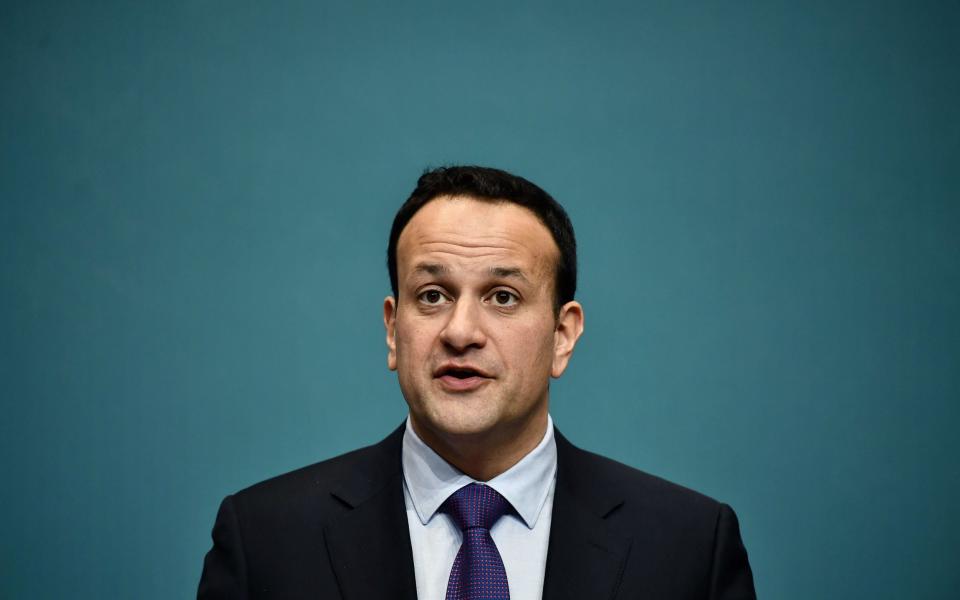Ireland’s new elite deludes itself with platitudes about mass migration

The most generous interpretation of Leo Varadkar is that he’s not that bright. On the day of the release of Emily Hand, the nine-year old held captive by Hamas, Ireland’s Taoiseach tweeted: “an innocent child who was lost has now been found and returned”. This suggested Emily had become separated from her parents in a shopping centre, not kidnapped by fanatics – but sympathetic theologians said, “He’s obviously quoting the parable of the prodigal son,” and if you don’t know it, “maybe you’re the idiot.”
Well, maybe I am because I cannot understand what he means. The prodigal son left home voluntarily, not at gunpoint, and his return was a metaphor for sin and reconciliation via Jesus (not a natural religious go-to for most Jews). While I share Varadkar’s belief that “our prayers have been answered” with Emily’s release, it surely owed something to the Israeli military operation that Varadkar’s government opposed. The Taoiseach, like the UN, is for a ceasefire.
I suspect he was trying to avoid undiplomatic language – to keep both anti-kidnap and pro-kidnap voters onside – and so reached into the gospels for a platitude that only exposed his reluctance to address the real issue: the evil of Hamas. Such exercises in deflection, deploying bromides to distract from error, are the calling card of the modern Irish elite.
The name of the game over there is globalisation. Varadkar is not a Left-liberal but a Right-liberal, and has balanced pro-market economics with social tolerance – the country gradually distancing itself from the “repressive” Catholic Church and nasty, nationalist Britain. Old Ireland exported workers fleeing poverty. New Ireland, the elite says, draws millions to its bosom because it is rich and open-minded.
Then, last Thursday, a man went crazy with a knife near a primary school in Dublin. The rumour mill said he was an immigrant; for a moment it looked as if the consensus might come under scrutiny, until far-Right thugs took to the streets to rob shops and torch vehicles.
One could almost hear the establishment sigh with relief, for now they wouldn’t have to talk about immigration and could denounce racism instead. Momentum built: it was reported that the attacker had been in the country for decades, and that he was stopped by a Brazilian. This meant plenty of sentimental soul-searching reasserting that Irish identity is shaped not just by history and culture but the more inclusive quality of legal residence – and characterised chiefly, in Leo’s poetic words, by “acting with compassion for others” (I can’t think of many countries that wouldn’t make the same claim. Except, perhaps, Gaza.)
Ireland, you see, does not have a problem with immigrants but with people who have a problem with immigrants, and it will not go the British route of giving them airtime. There will be no Irish Ukip, no GB News or Nigel Farage flashing his bottom on TV. Almost every journalist and politician agrees on this point; few could be called migration-sceptic. The populist opposition, Sinn Fein, is thoroughly enlightened on the matter.
This despite a Business Post poll that found that 75 per cent of respondents feel the country is “taking too many” newcomers, a figure that rises to 83 per cent among Sinn Fein supporters, and it’s easy to see why. Today around one in five residents was born abroad, an astonishing demographic change. Ireland has admitted about 100,000 Ukrainians, which is admirable, but they’ve often been housed in hotels, at considerable cost. Online opinion has been scandalised by the case of Jozef Puska, a Slovakian migrant who knifed a woman to death. For years he lived on benefits, gambling his cash away in tatty casinos, prompting social media to ask “is this how our generosity is repaid?”
The country has a housing crisis. It is feared that some arrivals disrespect women’s rights, implying that a liberal migration policy is itself perceived to threaten liberal norms. European nations are beginning to realise that tolerance hinges on border control, that if you permit too much change too soon, you risk a bigger nativist pushback down the line.
Sound familiar? Ireland’s experience of mass migration, despite its elites’ sense of moral superiority, has been very similar to Brexit Britain’s. The difference is we talk about it, and while having parties like Ukip might do little for our global reputation, it does act as a pressure valve for discontent. Ireland, by contrast, has chosen to double-down on the liberal narrative and Varadkar has even promised new laws to police hate speech, only driving debate into the darker recesses of the internet or, one fears, back on to the streets.
Israel has protested his bizarre Emily Hand tweet; Varadkar has pointed to a lengthier statement in which, yes, he did acknowledge she had been held hostage. Nevertheless, he is unquestionably at his most comfortable playing the politics of language, the notion that if we speak in banalities, this will encourage the population to think in banalities, and the underlying social conflicts will melt away.
Last year, when Boko Haram murdered 40 Christians in Nigeria, the president of Ireland, Michael Higgins, blamed the massacre on global warming. By embracing such embarrassingly literal woke clichés, the Irish elite fulfils its mission of making its country “like the rest of the world, only more so”. The problem with embracing hyper-modernity, however, is that when the world goes to Hell, Ireland will get there first.

 Yahoo Finance
Yahoo Finance 